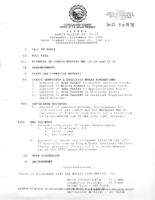Search the Special Collections and Archives Portal
Search Results

Meeting minutes for Consolidated Student Senate University of Nevada, Las Vegas, September 30, 1992
Date
Archival Collection
Description
Text
Audio recording clip from an Interview with Eva G. Simmons by Claytee D. White, February 4, 2013
Date
Archival Collection
Description
Part of an interview with Eva Simmons by Claytee D. White on February 4, 2013. Simmons talks about the formation of Les Femmes Douze, a scholarship-granting organization, that she helped found.
Sound
Minutes, October, 1989
Level of Description
Archival Collection
Collection Name: Southwest Oral History Association Records
Box/Folder: Box 01
Archival Component

Transcript of interview with Herb Tobman by Deborah Fischer, March 13, 1981
Date
Archival Collection
Description
Interview with Herb Tobman by Deborah Fischer on March 13, 1981. In this interview on the subject of gambling, Herb Tobman talks about moving to Las Vegas while working for Standard Oil as a tire, battery and accessory salesman, then began working for the Moulin Rouge as the general manager in 1955. He gives a description of the hotels on Las Vegas Boulevard and downtown, and the "western" nature of town where people rode horses. Tobman then discusses the types of gambling that were popular: slot machines, blackjack and craps. He also talks about the accommodations (hotels and motels) available in the 1950s, transportation to and from the area, entertainment, and the economy. The interviewer continually asks Tobman to compare 1950s Las Vegas with 1980s Las Vegas in terms of the gambling environment.
Text

Transcript of interview with Elliot B. Karp by Barbara Tabach, December 17, 2014
Date
Archival Collection
Description
Interview with Elliot B. Karp by Barbara Tabach on December 17, 2014. In this interview, Elliot Karp discusses growing up in a culturally Jewish household in New York and becoming more observant in his teenage and college years. He decided, after a trip to Israel and a year in a rabbinical program, that he wanted to be a "Jewish professional" with a focus on social work and community organizing, and attended a Master's program at Brandeis University. Karp goes on to talk about his work for the Jewish Federation in Ohio and Pennsylvania, and being recruited to come to Las Vegas. He talks about the challenges in the Las Vegas Jewish community and the Jewish Federation's role as an umbrella organization to partner with other agencies to grow and sustain a robust Jewish community in Southern Nevada.
On October 6, 1955, Elliot Karp was born in Mineola, New York to parents of East European heritage who identified as culturally Jewish. As a teenager, Elliot felt the calling to become kosher, balancing this practice with household norms that were not as strict. He eventually became shomer Shabbat just after enrolling at State University of New York at Stony Brook, where he majored in Political Science. After graduating from SUNY, Elliot spent a year living in Israel considering a path in rabbinical studies. By the end of his time, he decided on a different, yet related path, and registered as a graduate student in Brandeis University's School of Jewish Communal Service, on fellowship from Council of Jewish Federations. After graduating, Elliot moved to Columbus, Ohio to work for the Jewish Federation, focusing on fundraising, but was exposed to many different operational areas of the organization. After three years, Elliot was recruited to the Philadelphia office as its director of leadership development. He then left the Federation to work in development at Brandeis University, but after two years, returned to the Federation as the Cincinnati office's chief development officer. In 2008, Elliot received a call to take his highly cultivated leadership and fundraising skills to another Federation office: Las Vegas. After much consideration, he took the job - and challenge - as the office's new chief executive officer. Since then, Elliot has done much to promote communication, coordination and collaboration within the local Jewish community and beyond, through relationship building and successful fundraising efforts. His ultimate desire is to expand funding for programs that get more people involved in Jewish life - while also empowering community members define what a Jewish life means for them.
Text
Anderson, Eddie, 1946-
Eddie Anderson is a political and social activist based out of Reno, Nevada. In the 1990s Eddie Anderson was spokesman for NO HATE (Nevadans Organized for Human, Advocacy, Tolerance and Equality). His work is focused on fundraising for multiple sclerosis, political campaigning for the Democratic Party, and equal rights for minorities and women. Much of his work is concentrated on gay rights and promoting tolerance. Anderson had a career in the 1980s and 1990s as a radio talk-show host where he discussed many of these issues.
Person
Sussman, Laura A., 1956-
Laura Sussman was born March 26, 1956 in Cleveland, Ohio where there was a robust Jewish community. She moved to Las Vegas, Nevada in 1997. The Jewish Community Center (JCC) hired her as its first executive director. She was a director for eight years, then executive director at Temple Beth Sholom. Sussman met her wife, Wendy Kraft, through their work with the JCC and love followed. Several years later, in 2009, so did their new business, Kraft-Sussman Funeral and Cremation services.
Person
Levine, George, 1925-
George Levine is a former maître d' of the Sands hotel in Las Vegas, Nevada. Born on February 28, 1925 in Sommerville, New Jersey, Levine began waiting tables at the Sands shortly after he moved to Las Vegas in 1963. He worked his way up the ranks and was maître d' of the Sands from 1979 until the hotel closed in 1996. Levine's daughter is former United States Democratic Congresswoman Shelley Berkley.
Person

